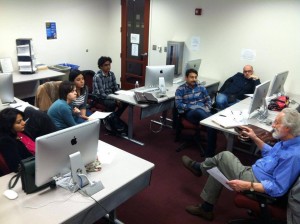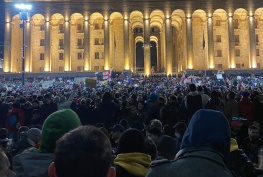On American Diversity
By Sherif Tarek, 2014 Daniel Pearl Fellow
One doesn’t have to stay long in D.C. or Los Angeles to realize they are ethnically and religiously diverse to a great extent. But what makes American diversity different from any other country?
I got the answer even before coming to the United States, from a friend who has spent time in both the U.S. and the U.K.:
“A Syrian in the U.K. would remain a Syrian, with all his/her traditions no matter how long they stay. So would an Indian or any other nationality,” she explained.
“But in America it’s another story; people might look different, but at the end of the day they are all Americans. They all think and act pretty much in the same way,” she added, expressing disgruntlement about what she described as “the loss of identities” in the U.S.

2014 Fellows with Professor Gary Weaver
Veteran American University professor Gary Weaver fully agrees with that point of view — especially for younger generations. However, his perspective is a lot more positive.
He believes that the “melting pot,” a widely used expression that refers to the assimilation and Americanization of different nationalities in the U.S., is very healthy for the sake of the nation’s unity and patriotism, unlike when ethnic groups are formed and create separate communities within the same city or country.
“You don’t want to have a little Pakistan or little China,” Weaver explained. “It’s never good for the country when different populations form little communities. People in the same nation should be united and vote for a president without considering his origins,” he elaborated.
While there is a clear logic behind each perspective, I tend to stand somewhere in between.
At least for now, I have no intention to emigrate from my homeland Egypt. But if I am to immigrate to the U.S. at some point, I would seek to hold on to my Egyptian identity. Definitely not to form a “little Egypt,” but out of pride of my origins and where I came from. Simply because this is who I am.




